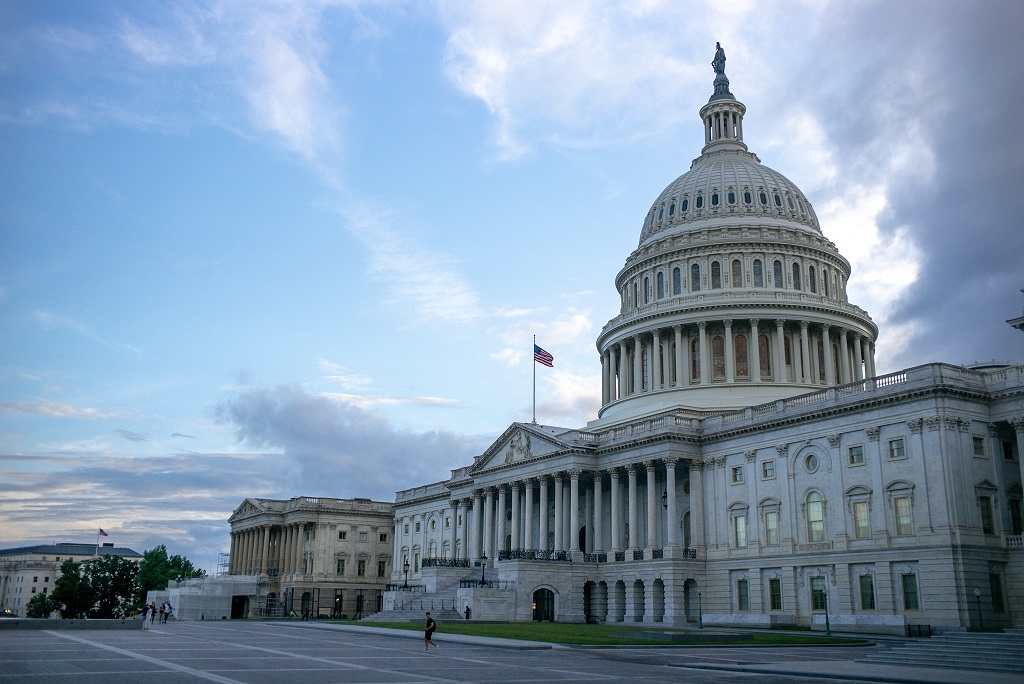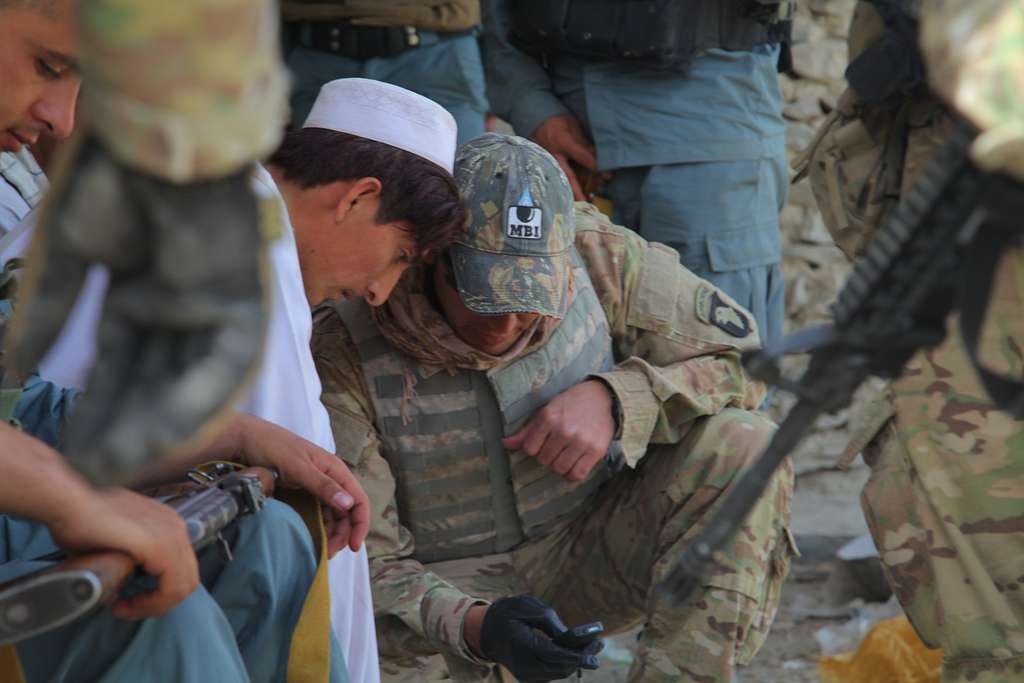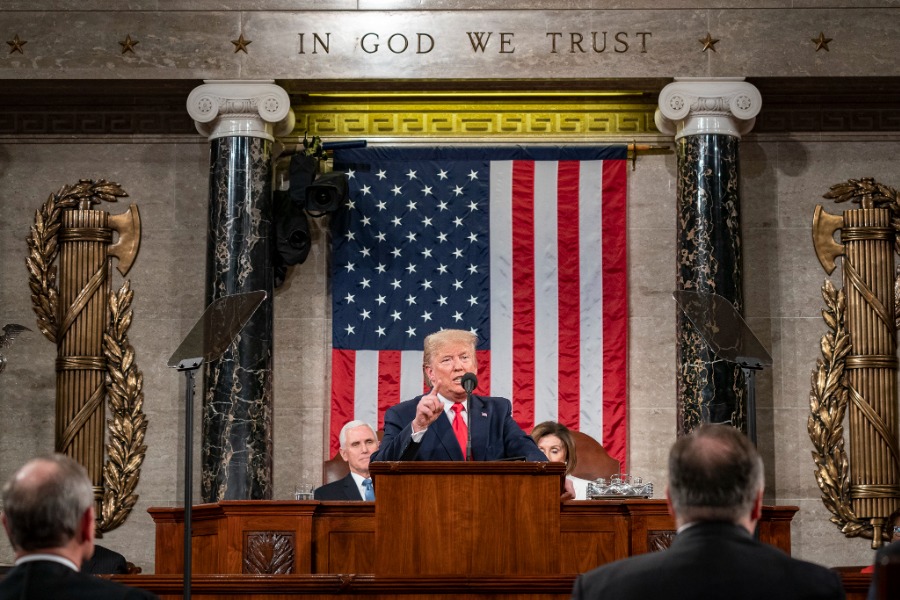Taking Stock of the Yemen Resolution
On Wednesday, Nov. 28, Congress took what may be its most important step to date towards openly opposing U.S. involvement in the Yemen war. By a vote of 63 to 37, the Senate elected to discharge a joint resolution directing an end to U.S. involvement in Yemen out of the Senate Foreign Relations Committee and on to the Senate floor. The resolution in question, S.J. Res.

Published by The Lawfare Institute
in Cooperation With

On Wednesday, Nov. 28, Congress took what may be its most important step to date towards openly opposing U.S. involvement in the Yemen war. By a vote of 63 to 37, the Senate elected to discharge a joint resolution directing an end to U.S. involvement in Yemen out of the Senate Foreign Relations Committee and on to the Senate floor. The resolution in question, S.J. Res. 54, was introduced by Sens. Chris Murphy (D-Conn.), Bernie Sanders (I-Vt.), and Mike Lee (R-Utah) in February 2018, and has remained in committee since that time. Wednesday’s vote sets up a possible Senate vote on whether to proceed to consideration on the joint resolution for next week, which could in turn lead to a vote on the resolution itself.
This decision is an indisputable victory for those who oppose the Trump administration’s continued support for the Saudi-led coalition in Yemen, whose military campaign against Houthi rebels is at the heart of the current conflict. But that victory is likely to prove more political than legal. There are many obstacles that S.J. Res. 54 must surmount before it can become law—and even then, it’s not clear that it will have the legal effect of ending U.S. participation in the Yemen war. That said, Wednesday’s vote may still be a significant step towards that objective.
How did this happen?
Molly Reynolds and I first wrote about S.J. Res. 54 for Lawfare in March 2018, when its supporters were facing a similar procedural vote—one they eventually lost on a vote of 55-44, with only five Republicans supporting continued debate. Between that vote and this past Wednesday, 19 senators effectively changed their positions on the matter. This includes eight Republicans, several of whom—such as outgoing Senate Foreign Relations Chairman Bob Corker (R-Tenn.) and Lindsey Graham (R-S.C.)—are influential figures in the party. So what brought these senators around?
Undoubtedly, the conflict in Yemen and its humanitarian consequences have continued to worsen. Since March, the Saudi-led coalition has been tied to several high-profile attacks resulting in substantial civilian casualties, including a deadly August attack on a school bus in which the Saudi-led coalition used U.S.-supplied armaments. Meanwhile, widespread famine and disease—aggravated by the Saudi-led coalition’s embargo of Yemeni ports—led U.N. Secretary-General Antonio Guterres to label Yemen “the world’s worst humanitarian crisis.” The situation has grown so dire that several leading humanitarian organizations recently released an extraordinary statement calling for an end to hostilities by any means possible, on the grounds that “every humanitarian effort can no longer prevent mass starvation if the war is not brought to an end immediately.”
That said, there are reasons to believe that those 19 senators changed their minds less because of Yemen and more because of Saudi Arabia. The October murder of Saudi dissident and Washington Post columnist Jamal Khashoggi by Saudi agents—an act widely believed to have been directed by Crown Prince Mohammed bin Salman, often referred to by the initials MBS, the architect of the Saudi-led intervention in Yemen and a close ally of the Trump administration—has triggered renewed skepticism of U.S. entanglements with Saudi Arabia. The Trump administration, however, has openly resisted calls to hold Saudi Arabia or the crown prince accountable in ways that might injure bilateral relations, limiting itself instead to sanctions on lower-ranking individuals directly involved in the killing. Last week, President Trump went so far as to issue a bizarre, seemingly hand-crafted statement expressing doubts about the crown prince’s involvement and making clear his position that “[t]he United States intends to remain a steadfast partner of Saudi Arabia.” This is in spite of the CIA’s assessment that MBS most likely did order the killings, which CIA personnel briefed congressional intelligence committees on just days before Trump’s statement.
Two related developments just prior to Wednesday’s vote may have tipped the scales in support of the motion to discharge. The morning of the vote, Secretary of State Mike Pompeo published a Wall Street Journal op-ed dismissing concerns over the Khashoggi murder and Saudi Arabia’s human rights record as “Capitol Hill caterwauling and media pile-on.” Then, later that day, both Pompeo and Secretary of Defense James Mattis testified before the Senate Foreign Relations Committee on U.S. military assistance to Saudi Arabia. But despite requests by Corker and others for CIA Director Gina Haspel to attend, Haspel was absent—reportedly blocked from attending by the White House in an apparent effort to avoid further discussion of the CIA’s Khashoggi assessment (though White House and CIA officials have disputed this account). Corker himself referenced the “very unsatisfactory” briefing that Mattis and Pompeo had provided in explaining his vote supporting discharge, and Graham threatened further obstruction until Haspel testifies. Others may have been similarly motivated.
What happens next?
S.J. Res. 54 is expressly designed to take advantage of certain “expedited procedures” provided by an amendment to the 1973 War Powers Resolution (WPR) for bills and joints resolutions that “requir[e] the removal of United States Armed Forces engaged in hostilities outside [U.S.] territory ... without a declaration of war or specific statutory authorization ... .” The practical effect of these procedures is to allow supporters to force Senate votes on whether to discharge the measures from committee and proceed to consideration (i.e., vote on them). These procedures also limit the time available for debate on such motions, preventing filibusters and other procedural hurdles that opponents might otherwise employ.
Wednesday’s vote in favor of the motion to discharge brings S.J. Res. 54 one step closer to consideration on the floor. Corker has indicated that a vote on whether to proceed to consideration will take place next week, in what appears to be a timeline negotiated among supporters of the motion. If this passes, debate will begin and be limited to 10 hours. During this time, the Senate will also consider any amendments, which are permitted by the WPR and not expressly required to be germane. As a result, this debate could get messy and involve amendments on a variety of topics unrelated to Yemen. Supporters may seek to reach a negotiated agreement that moves S.J. Res. 54 to a final vote with no or only very limited amendments. A less likely outcome is a “vote-a-rama” in which senators vote on a host of amendments once the time for debate on the resolution has expired. Regardless, once amendments and any procedural disputes are disposed of, the Senate will hold a final vote on whether or not to approve S.J. Res. 54 as amended.
Then the resolution heads to the House, where the Republican leadership recently took steps to strip a similar Yemen-related proposal under the WPR of its privileged status, making the path to a final vote more difficult absent that leadership’s support. For this reason, companion legislation in the House may have to wait until January, when the House’s newly-minted Democratic leadership will take control. At that point, however, the Senate will also have to renew its approval of S.J. Res. 54, effectively restarting the process with a new assembly of Republican senators, some of whom may be less friendly toward the resolution. Regardless, if and when legislation is passed in the Senate and House, the separate measures will have to be reconciled and, if necessary, brought back to each chamber for final approval. At that point, the consolidated legislation will be presented to the president for a potential veto—an option that Trump has already indicated he intends to exercise. If the House and Senate seek to override this veto with a two-thirds majority in both chambers, the WPR’s expedited procedures once again limit the time available to debate the president’s veto message in the Senate. Only if the veto override is successful will S.J. Res. 54 become law.
What will the joint resolution do if it becomes law?
The operative language of S.J. Res. 54 is short, simple, and to the point: It “directs the President to remove United States Armed Forces from hostilities in or affecting the Republic of Yemen” within 30 days, except for those “engaged in operations directed at al Qaeda or associated forces[.]” This parrots the language of the WPR’s expedited procedures provision, ensuring that the joint resolution as a whole qualifies for the privileged status and limited debate periods for which that provision provides.
Yet this narrow scope is a double-edged sword. The Trump administration has argued that the activities it is pursuing in support of the Saudi-led coalition in Yemen—namely, “defense articles and services, including air-to-air refueling; certain intelligence support; and military advice, including advice regarding compliance with the law of armed conflict and best practices for reducing the risk of civilian casualties”—do not constitute “hostilities” for the purposes of the WPR. Even if S.J. Res. 54 were enacted, the Trump administration contends, it would have no legal effect.
This interpretation may not be correct; indeed, in its preamble, S.J. Res. 54 expresses a contrary view of what constitutes “hostilities.” But it should be taken seriously. The Trump administration’s position is consistent with long-standing executive branch practice in regard to the WPR’s related reporting requirements. Moreover, it’s arguably consistent with certain public positions adopted by the Obama administration. These factors—and the congressional acquiescence they arguably imply—may weigh heavily in the government’s favor, even if the federal courts were to overcome their usual reticence and rule on the matter. And perhaps more importantly, by virtue of its constitutional authority over the military and law enforcement, the executive branch’s views on what constitutes “hostilities” are likely to remain operational unless and until a federal court holds to the contrary. As a result, it’s unclear whether S.J. Res. 54 will have the effect intended, even if it is ultimately enacted into law.
What else could Congress do?
Congress may be able to take additional steps that would have a more certain legal effect on U.S. participation in the Yemen conflict. But each poses its own substantial set of challenges.
One option would be to amend S.J. Res. 54 in order to expressly prohibit those activities the United States is pursuing in Yemen, in addition to removing U.S. troops from hostilities—regardless of whether those activities formally constitute hostilities under the WPR. (Alternately, Congress could move the definition of “hostilities” that S.J. Res. 54 currently suggests in its preamble into its operative text, to similar effect.) That said, it’s still not entirely clear that an amended joint resolution that does more than just “remov[e] United States Armed Forces engaged in hostilities” (as currently defined in the WPR) can still qualify for the WPR’s expedited procedures. Efforts to expand S.J. Res. 54 beyond this scope are likely to trigger procedural fights that may ultimately involve the Senate parliamentarian. The end result of these debates could be to deprive S.J. Res. 54 of its privileged status, once again making it vulnerable to filibusters and other procedural obstacles. At a minimum, such amendments could cost the support of senators who wish to preserve the WPR’s expedited procedures as a more tailored legislative gateway.
Alternatively, Congress could simply pursue legislation independent of the WPR that expressly prohibits current U.S. activities in Yemen, without tussling over how to define hostilities. Congress adopted certain limitations along these lines in the most recent National Defense Authorization Act (“NDAA”), though these limitations were contingent on a certification requirement regarding Saudi humanitarian efforts—a certification that Pompeo ultimately issued, despite concerns among his State Department subject-matter experts that doing so was not credible. Other members of Congress have introduced free-standing bills that would establish even more concrete restrictions, such as the Saudi Arabia Accountability and Yemen Act of 2018. Because much of the support the United States provides to the Saudi-led coalition is pursuant to statutory authorities, legislation explicitly limiting this conduct will impose real legal restrictions on what the Trump administration can do. And while the Defense Department has suggested that it might be able to continue certain activities in spite of a legislative prohibition, this argument is for the most part unavailing.
That said, any such legislation would have to overcome all the normal obstacles of the legislative process—including the need to secure the permission of Senate Majority Leader Mitch McConnell (R-Ky.) to move it to the floor for a vote. Supporters of such legislation may be able to secure such authorization if they are willing to obstruct other aspects of McConnell’s agenda (such as judicial nominations) or if they are able to incorporate it into must-pass legislation (such as omnibus appropriations or authorization legislation like the NDAA). Even then, the legislation could potentially still be vetoed by President Trump, though the latter strategy could make it exceptionally more difficult for him to do so.
At a minimum, if S.J. Res. 54’s supporters determine that their best route forward is to pursue the joint resolution as-is, then they may wish to take steps to strengthen their hand in any ensuing litigation that seeks to vindicate their view of “hostilities.” One way to do so may be for Congress, or even just the Senate, to explicitly authorize an individual legislator, committee, or other entity to pursue litigation on its behalf, either through an amendment to S.J. Res. 54 or a separate concurrent (or Senate) resolution. This strategy, which senators have incorporated into other recent bills, could help avoid certain standing issues that have proven fatal to other WPR-related legal challenges. Other obstacles, however, will still remain.
So why was Wednesday’s vote so important?
The conclusion that S.J. Res. 54 is unlikely to be enacted into law—and may have no legal effect even if it is—is likely to be discouraging for those wishing to end the conflict in Yemen (or U.S. involvement in it). But these legal shortcomings should not distract observers from the immense political significance of Wednesday’s vote.
By allowing senators to force a vote on bills like S.J. Res. 54, the WPR’s expedited procedures provision serves as a powerful tool for political accountability. It required every senator to take a public position on whether Congress should consider a joint resolution that at least purports to direct an end to the Trump administration’s policies in Yemen, one for which they will be held accountable in future elections. And the fact that every Democrat and more than a quarter of Senate Republicans voted in favor of this motion is a damning sign of how little confidence members of Congress have in the president’s handling of this set of issues—something that should be of serious concern for the Trump administration (not to mention Saudi Arabia). Moreover, the fact that the bill gained enough votes for a filibuster-proof supermajority underscores the real possibility of additional hearings, investigations, and restrictive legislation, particularly once control of the House of Representatives shifts to the Democrats.
Of course, the fact that senators supported Wednesday’s motion to discharge does not mean they will vote for the substantive resolution itself or future efforts to tie the Trump administration’s hands—a point Corker makes explicitly in his statement explaining his vote. Instead, many senators, particularly Republicans, may have used Wednesday’s vote as a means of sending a message to the Trump administration about the depth of their concerns and the steps they may be willing to pursue if those concerns are not addressed. The waiting period between Wednesday’s vote and next week’s debate seems designed to give the Trump administration a chance to begin to respond to these concerns—most immediately, by sending Haspel to testify as requested. If the Trump administration indicates that it intends to do so, then some of the senators who supported Wednesday’s motion may well withhold their support from future votes on the resolution, at least for the time being. If it does not, then those senators may be willing—or even feel compelled—to support more dramatic restrictions on the Trump administration’s actions, either through S.J. Res. 54 or in some other form. Indeed, Congress has already demonstrated its willingness to enact measures restricting Trump administration Yemen policies in the most recent NDAA. Additional restrictions may well be forthcoming in future veto-resistant omnibus legislation—including some less easily evaded than those in last year’s NDAA.
Wednesday’s vote is ultimately part of an extended negotiation between Congress and the executive on the future of U.S. policy towards Yemen. And the final outcome of these negotiations remains far from clear. Yet in demonstrating the depth of reservations about the Trump administration’s policies—and forcing senators to express them publicly—S.J. Res. 54 has made clear that the momentum for a policy change is real and growing, whether it comes through policy shifts, additional legislation, or future elections. And even if S.J. Res. 54 is not the vehicle that brings an end to U.S. involvement in the Yemen war, Wednesday’s vote may well turn out to have been a key tipping point in that direction.
The author would like to thank Molly Reynolds and Margaret Taylor for their invaluable input on this piece.





